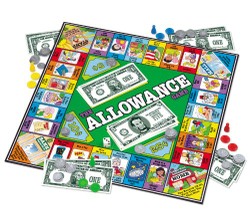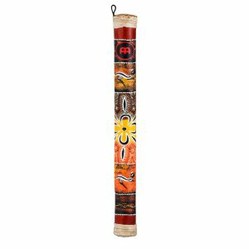Kids grow up there is nothing we can do about it. It is the here and now, while young, that molds them determining their level of success in life. While this may seem like a huge weight of responsibility on you the parent, much of what we do or do not do determines what our children achieve and enjoy as an adult. One of the most basic laws of life is the power of the almighty dollar or lack thereof; yes, your child is learning now or should be. Each child on the face of this planet will one day grow up to earn a certain amount of money.

Should I Give My Child an Allowance?
by katiem2
What should I give my child for an allowance is a great question every parent should ask. Learn the healthy steps you can take to insure your child grows up money smart.
How Much Allowance Should Kids Get?
The amount of allowance kids get is less important than the education they receive.
The financial education a child receives determines the degree to which they enjoy the options life has to offer. Money is the means by which they get everything in life. The time is now to teach money fundamentals; the ebb and flow of money and what it takes to get what you want in life. Teaching good habits develops the appreciation and value of money and its powerful uses.
Parents Finances Effects the Kids
The way you spend money, shop and provide for your child teaches them bit by bit as they grow they develop habits and attitudes about money you may not be aware of.
It takes a child little time to learn the power of “I want”, or “Can I have that” while busy parents rush through a shopping experience how unprepared for such persistent request. Do you opt for the time saving, “sure honey” and toss it in the cart or cute and adoring hands? This is a breeding ground for a distorted sense of money and the means by which things are obtained. Do you send the “ask and you shall receive” message or do you teach your child the truth about earning what you get?
Allowance for Young Kids
While kids are babies they learn how to get what they want, it's very important to teach your young child about money and how it takes money to get what you want.
Children are capable of learning the value of money at a very young age and quickly its true value. In life, people earn a salary based on their skill level. The job or profession they choose will pay an allotted amount allowing them to attain a particular life style. Teach your children early on, while they still listen to you, that money determines a lot about life; what they have, where they live and the toys they acquire. It really is up to us, the parents; little to nothing is covered in terms of finances and money in schools. It is up to you to give your child the facts and tools regarding money. Provide them with the educational tools they need to succeed. By doing so kids learn to earn money, make it grow, spend it wisely and become financially independent. You will both be so very glad you did.
How Advertising Brainwashes Kids
Learn how all those wants and demands for toys and products enter your son or daughters heads and what to do about it.
Children soon develop the, “I wants” and it is no wonder with all the advertisements they see on TV, radio, in books and at your local stores while shopping. In fact, if you take a moment to notice all the brightly colored ads everywhere you soon realize the advertising directed at your young children. Marketers, those you love and trust, are heavily marketing your family, primarily your kids.
After all marketers, know how to tug at your heartstrings, manipulating your kids to request items generating desires from their ads, the purse strings are not far behind. Meaning, you and your wallet make your child happy. The more important thing is to teach kids about advertising and how it tries very hard to convince them they want something they really do not nor need.
Money Lessons for Kids
Give your kids the tools to both understand and over come advertising targeting them and making them think they want things.
Show The Marketers Who's In Charge of Your Families Budget
Teach your child money skills by playing my cut and paste game, be a powerful role model.
How TV Influences Kids
TV Brainwashes Kids to Pressure Parents to Buy More
- The next time your child brings an advertisement to you and shows you a picture of what they want, have them go set with scissors and craft materials.
- Tell your child to cut out what they want and make a chart or board including the price of the item. You will need to show them the prices as this is something they may not be aware. Ah ha, we first make them aware of cost.
- Cut and paste the item and its cost on a board and explain the amount it cost.
- Go on to explain that anytime something is needed we plan and save for that item and once the money is set aside bit by bit the item can then be purchased.
- Ah they have just learned the concept of budget!
Empowering Kids With Allowance
A fun easy game every family can easily add to their lives and educate their entire family about money.
Explain the Power of Money
Now comes the part where you explain how things cost money and how it is earned.
- Go on to explain that a certain amount of money is earned for a certain task.
- This is when you add an outline of things your child is expected to do for two dollars a week, the amount depends on their age.
What Experts Say About Allowance
Experts say kids should get an allowance to teach them about money, it's uses and importance in our lives.
- Experts say you start out with a dollar per year of age at around the age of two increasing it a dollar each year as they age or personality appropriate amounts, they should get more for working to earn more, going above and beyond.
The Deal With Kids Allowance
You now make the deal, explain what it is you expect your child to do everyday.
- You then explain this is how you earn your two dollars a week.
- Go further to explain you use your money to buy the things you want. This is where the chart comes into play.
- You will need to guide your child helping them determine how much money they want to put toward each item each week.
- Once they reach the goal they will have learned the power of earning it. The most powerful lesson earned here is that of impulse.
- After working to save the money the child often feels the item just isn't worth it or not something they really truly wanted after all.
- It feels good to lose the impulse spending habit!
- Then they are left to imagine their money growing to a much larger amount.
The Next Shopping Trip
- Naturally your child has formed a habit of asking for things and getting them.
- It’s important to reinforce what your child has learned and now put it to work forming a habit of using money as a tool.
- When your child ask for something you reply, “How much of your money did you bring with you today?”
- The idea is to allow them to spend it freely at first but the key is for you to be firm and reminding them each time they want something to stick to the plan of spending within their budget.
- You will be amazed at how quickly they shift their thinking about the “I wants”.
How to Raise Money Wise Kids
The best thing we do for our kids is to teach them all about money using practical techniques.
Enterprising Youngsters
I have two children myself, one very frugal who's learned to stay within the budget and the second who’s a spender adopting the how do I earn more attitude. This is good in both regards.
I've outlined a chart of chores that pays a set amount which allows the kids to earn more toward the purchases they want or ultimately adding to their bank account.
No Brain-er
You’re obviously intelligent enough to understand the power behind this approach and that it does far more than teach your child about money.
- This in fact empowers your child to feel good about themselves, their abilities and teaches them practical life skills.
- It also gives them incentive to do well in school in order to raise their adult earning power and options in life.
All in all this is a win win for everyone involved, so put your own personal twist on it and by all means please do give your child an allowance!
How to Teach Kids to Save Money
There are many far more reasons not to spend money than the old tired, we can't offered it, sending the message of lack.
This almost always makes kids want more in order to fill secure. Here's a great list of powerful reason why not to buy something you don't need.
Other Powerful Learning Tools
This is a wonderful time in the life of your child. The entire allowance concept will open new and powerful opportunities for learning and growth. Each time your child has difficulty in a situation and develops a case of the “I wants” remind them of these great facts.
- The more you buy the more trash you create.
- Talk about what can be recycled and what can’t, imagine the land fills.
- Get your child involved in a recycling project at home.
- Knowing the trash goes into a land fill and how it works is powerful.
- Ask, “What are your plans for this item?”
- Ask your child to look carefully at the amount of packaging considering if it's environmentally friendly, site the landfills once more.
- Do you have room for this in your room, is your room clean, neat and organized, taking care of what they already have?
- Remind them it’s their job to take care of their planet, home and money.
You don’t know until you’re taught, so have fun teaching your child all the wonderful ways they can spend wisely and do their part to take good care of their future. You will be so happy you did now and in the future.
Much Love and Happiness, Katie
You might also like
Buy Rain SticksRain sticks are a great source of fun for kids both young and old. A rain sti...
How to Find Out What Your Kid is DoingEver wonder what really goes on at school, all the secret details you get the...











 Guide to Sourdough Bread Using Cups, Ounces and Spoon Measurementson 09/27/2025
Guide to Sourdough Bread Using Cups, Ounces and Spoon Measurementson 09/27/2025
 Parents Discover 3 Stress-Free Ways to Readingon 09/25/2025
Parents Discover 3 Stress-Free Ways to Readingon 09/25/2025
 How to Get More Reviews for Your Book: Why Authors Love Pubbyon 09/07/2025
How to Get More Reviews for Your Book: Why Authors Love Pubbyon 09/07/2025
 3 Best Blue Lotus Oils And Benefits That Wow Youon 06/03/2024
3 Best Blue Lotus Oils And Benefits That Wow Youon 06/03/2024



Share your allowance experiences
2uesday, Very good point money builds up to a very rewarding gain only making both kids and adults want to continue.
cmoneyspinner, The money games by rich dad poor dad is great. Worked wonders for my own children.
Great article! Particularly like the game suggestion "Allowance Magic".
Jerrico, Good tips, thanks for putting your two cents worth in on the allowance debate. :)
I tell you thank the gods for the dollar/99 cent stores... when I raised two girls to about 14 years old, I gave them money but they earned every penny, I didn't have to give them much, but spending power was always a problem- sure a kid should have less than 5.00 a week (younger kids) but everything out there is expensive! now with the dollar trees and such, their money goes farther so you can as a parent, essentially, get more bang for your buck! They feel 5.00 spends well so that's what you give them. Leaves room for raises and bonus allowances I called them :)
Me too guys, I firmly believe kids learn the value of money plus become more ambitious by the lessons learned earning an allowance.
I am all for allowance. Not only does it teach about managing money, it teaches kids to delay gratification and just how hard you have to work to make it.
It is important to help kids to stay within their allowed budget. Excellent article, voted up.
Tolovaj, I agree, it is my intention to get parents thinking more about what they do with their own money and consider the examples they make. I've seen families turn their entire financial situation around by opening up with both themselves and their children about money. It is a topic many families don't approach openly with a healthy dose of reality. Great comment, thanks for adding your feedback.
Belinda, Great to hear this article has you thinking more carefully about how you spend money and the possibilities of an allowance enhancing your parenting options.
There are two theories about allowance, one saying kids need it and other they don't. Although I am personally pro allowance, I think both can be right if the attitude to the money is right. Responsible parents should talk about money with their children and most important of all is role model. If parents can't control their money, kids will have very hard time to deal with this part of life.
I have seen it many many times.
So: allowance money is in my opinion great tool to give a kid a chance to learn from his own mistakes (and don't make too painful ones).